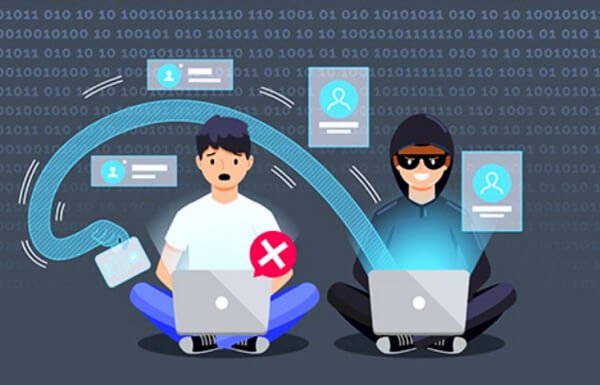The cybersecurity tips for students are crucial in the digital world, which provides students with an abundance of tools and opportunities. This thorough guide provides you with critical cybersecurity guidelines to protect your digital identity and ensure the smooth sailing of your online academic adventures.

What Does Cyber Safety Mean?
Protecting yourself and your information when using the internet and digital devices is the main goal of cyber safety, which is also frequently referred to as online safety or internet safety. It includes a range of methods and safety measures to reduce the hazards connected to internet activity.
The essential features of cyber safety are outlined below:
- Safeguarding sensitive information against unwanted access, such as credit card numbers, passwords, and social security numbers, is part of protecting personal information.
- Cyber safety requires exercising caution while downloading files or clicking on links from untrusted sites to avoid malware infestations, which can damage your equipment and steal your data.
- Battle Phishing and Scams: Cyber safety precautions assist you in spotting and avoiding online scams that aim to deceive you into sending money or divulging personal information.
- Safeguarding Your Online Identity: To limit who can access your information and activities, you should modify the privacy settings on social media and other websites.
- Cyber safety also fosters responsible online conduct, which includes sharing content with caution and abstaining from cyberbullying and harassment.
Making the internet a safe and enjoyable place is the essence of cyber safety. With less danger to your safety, security, and privacy, it gives you the ability to fully utilize the internet’s possibilities.
Related: Budgeting Bootcamp: From Zero To Hero In 5 Easy Steps

What Is Cyber Safety For Students?
Cyber safety for students is all about remaining safe and responsible in the digital environment. The internet is a fantastic resource for study, communication, and entertainment, but it, like the real world, can include hidden risks.
Here’s an explanation of why internet safety is critical for students:
- Protecting Personal Information: Because students are generally unfamiliar with online hazards, they are more susceptible to scams or phishing assaults that attempt to obtain passwords, addresses, or financial information.
- Avoiding unwanted information: The internet can expose pupils to offensive information, such as violence, hate speech, or cyberbullying. Cyber safety measures allow them to safely explore their online surroundings.
- Responsible Digital Citizenship: Students are becoming more engaged in the online environment. Cyber safety education teaches students about responsible online behavior, such as respecting others, protecting their privacy, and avoiding plagiarism.
- Cybersecurity hazards, such as malware or data loss, might stymie a student’s academic development. Cyber safety policies protect their work and devices.
Here are some major components of cybersecurity for students:
- Strong Passwords and 2FA: Creating strong, unique passwords and enabling two-factor authentication for online accounts provides an additional degree of security.
- Students should exercise caution when downloading files or clicking on links from untrustworthy sources to avoid malware infection.
- Social Media Smarts: Understanding privacy settings and being mindful of what they share online protects students from social media dangers like cyberbullying or unwanted attention.
- Avoiding Online Scams: Knowing how to identify phishing attempts and other online scams can safeguard students from losing money or personal information.
- Cyberbullying Awareness: Students should be aware of the signs of cyberbullying and know how to report it if they encounter it themselves or see it happening to others.
Cost Of Convenience: Identifying And Eliminating Hidden Expenses

The Cyber Safety Tips For Kids
The internet is a fantastic jungle gym of fun and learning for kids! But just like a real jungle gym, there are some safety rules to remember to keep things awesome. Here are some super-important cyber safety tips to help you explore the web safely:
Password Power:
- Create strong passwords: Just like superheroes have secret identities, your online accounts need secret passwords! Make them strong with upper- and lower-case letters, numbers, and symbols. Think of them like your superhero suit’s password – don’t share them with anyone except maybe a grown-up sidekick you trust, like a parent or teacher.
- Don’t write them down! Imagine someone finding your password hidden under your bed—that wouldn’t be good! Instead, adults can help you use a special password manager app to keep them safe.
Spotting Scams and Tricks
- Beware of fishy links! If you see a weird link in an email or message, don’t click on it! It could be a trick from a bad guy online trying to steal your information. Think of it like a stranger offering you candy – don’t take it without checking with a grown-up first!
- Be careful of free stuff online. If something seems too good to be true, it probably is! Free games or downloads might have hidden dangers. Talk to a grownup before downloading anything, just like you would ask permission before taking a new toy from a friend.
- Not everyone online is your friend. Just like on the playground, you shouldn’t talk to strangers online. Only chat with people you know in real life, and if someone makes you feel uncomfortable, tell a grown-up right away! They’re like your personal superhero, ready to help if anything feels wrong.
Sharing with Care:
- Think before you post! The internet is a big place, and once you share something online, it can be hard to get it back. Imagine throwing a ball—you might not always get it back! Ask yourself if you’d be okay with everyone seeing a picture or message before you post it.
- Privacy settings are your friend! Many websites and apps have privacy settings. Talk to a grown-up about adjusting them so only people you know can see your information, like how you wouldn’t share your home address with everyone you meet.
Surfing Safely:
- Ask for permission to access the internet. The internet is like a giant playground, and adults want to know where you’re going! Before going online, consult a parent or instructor, especially if you are using a new website. It’s like seeking permission to go to a new playground area!
- Take care when using public Wi-Fi. Public Wi-Fi, such as in the library or park, is not necessarily secure. Avoid using it for crucial tasks, such as checking your bank account, just as you would not use a public restroom to change into your swimwear.
- Keep your grownups in the loop! If you see something disturbing or ambiguous online, don’t be afraid to tell an adult you trust. They can help you understand it and keep you safe, just like if you were lost on the playground.
Related: Cost Of Convenience: Identifying And Eliminating Hidden Expenses

How To Be Smart Online
Being smart online, or practicing good cyber hygiene, is all about protecting yourself and your information while navigating the vast digital universe. Here are some key principles to remember:
Shielding yourself:
- Fortress Passwords: Make strong and unique passwords for each account. Consider the various combinations of upper- and lower-case letters, numbers, and symbols. Consider using a password manager to create and securely store passwords.
- Enable two-factor authentication (2FA) wherever it is feasible, according to Two-Factor Guardian. This requires a second verification number, such as one texted to your phone, in addition to your password, adding a degree of protection.
- Phishing is a real threat, so even if an email or message seems authentic, avoid clicking on dubious links or files. Phishing schemes aim to deceive you into divulging private information or downloading malicious software.
Safeguarding Your Electronics:
- Software Guardian: Update the security patches on your web browser, operating system, and other software programs. Frequently, these updates fix security holes that cybercriminals could use.
- Antivirus Armor: Invest in a reputable antivirus and anti-malware program. Regularly scan your devices to identify and eliminate any potential threats.
- Firewall Fortification: Ensure your device’s firewall is enabled. This acts as a barrier, filtering incoming and outgoing traffic and preventing unauthorized access.
Social Media Savvy:
- Privacy Check-Up: Review and adjust your privacy settings on all social media platforms. Limit who can see your profile information, posts, and activity.
- Think Before You Post: Exercise caution while posting anything online. Negative effects may arise from over-disclosing private information or from compromised images.
- Watch Out for Friend Requests: Avoid accepting friend requests from someone you don’t know well. Link only with those you know and believe in.
Stepping Out Cautiously:
- Use caution when using public WiFi, as some of these networks may be insecure. Refrain from using public Wi-Fi to access financial accounts or sensitive information. When using public networks, think about utilizing a Virtual Private Network (VPN) for enhanced protection.
- Free software downloads from unreliable sites should be avoided, as they may include malware. When downloading software, stay with reliable sites.
- Back-Up Your Data: Ensure that you frequently create a backup of all of your crucial files, papers, and assignments to an external device or cloud storage platform. This guarantees that in the event of a gadget malfunction or hack, you won’t lose your work.
Beyond the Fundamentals:
- Keep Up to Date: The environment of cyber threats is always changing. Keep abreast of new hazards and modify your online behavior accordingly.
- Online offers should be avoided; if something looks too good to be true, it most likely is. Deals that are too good to refuse or unsolicited offers should be avoided.
- Be Skeptical of Online Sources: Before believing information found on the internet, double-check its credibility. Look for respected websites and confirm facts using credible sources.
Related: Starting Your Investment Journey Without Feeling Overwhelmed
Conclusion
Following these cybersecurity tips and taking a cautious approach online can dramatically minimize your risk of becoming a victim of a cyber attack. Remember that maintaining internet safety is an ongoing process. Keep up with developing threats and adjust your approach accordingly. With a little caution, you can navigate the digital world with ease and concentrate on your academic goals!

